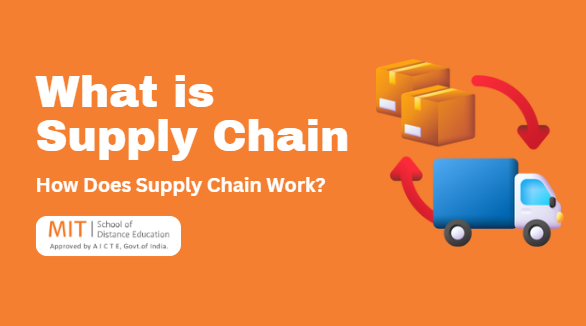
Supply Chain Management (SCM) is the backbone of modern business operations. From manufacturing to delivery, SCM ensures that products reach customers efficiently, cost-effectively, and on time. If you’ve ever wondered, “What is Supply Chain Management?”, or “How does it work?”,
This blog will explain it all—and why it’s a promising career path.
What is Supply Chain Management?
Supply Chain Management refers to the coordination of all activities involved in producing and delivering a product, from sourcing raw materials to delivering the final product to the customer. Its main goal is to maximize efficiency, reduce costs, and satisfy customer demands.
In today’s global business environment, effective SCM is crucial for companies to remain competitive, respond quickly to market changes, and maintain customer satisfaction.
Key Components of Supply Chain Management
A supply chain is made up of several interconnected stages:
- Procurement & Sourcing – Selecting suppliers and acquiring raw materials.
- Production & Manufacturing – Transforming raw materials into finished products.
- Inventory Management – Maintaining optimal stock levels to meet demand.
- Warehousing & Storage – Safely storing products until they’re needed.
- Transportation & Logistics – Moving products to distribution centers or customers.
- Distribution & Retailing – Delivering products to end-users efficiently.
How Does Supply Chain Work?
A supply chain ensures products move smoothly from suppliers to customers through planning, sourcing, production, inventory management, transportation, distribution, and returns, ensuring efficiency, cost savings, and timely delivery.
- Planning – Forecasting demand and scheduling production.
- Sourcing – Choosing suppliers and procuring raw materials.
- Production – Manufacturing goods and ensuring quality control.
- Inventory Management – Tracking stock and optimizing storage.
- Transportation & Logistics – Delivering goods to distribution points.
- Distribution – Moving products to retailers or directly to customers.
- Returns Management (Reverse Logistics) – Handling defective or excess products.
By integrating these steps, SCM ensures efficiency, cost savings, and timely delivery.

Why is Supply Chain Management Important?
Supply Chain Management is important because it reduces operational costs, improves efficiency, ensures timely delivery, enhances customer satisfaction, and gives businesses a competitive edge in the global market.
SCM plays a vital role in business success:
- Reduces operational costs
- Enhances customer satisfaction
- Improves efficiency and productivity
- Provides a competitive advantage
- Supports global trade
a well-managed supply chain keeps businesses profitable, agile, and customer-focused.
Types of Supply Chain Models
Depending on business needs, supply chains can follow different models:
- Continuous Flow Model – Smooth, constant flow of products
- Agile Model – Quick response to changing customer demands
- Fast Chain Model – Focus on speed and rapid delivery
- Flexible Model – Adapts to changes in product design or demand
- Custom-Configured Model – Tailored for specific customer requirements
Challenges in Supply Chain Management’
Supply Chain Management faces challenges like demand fluctuations, supply disruptions, rising costs, technology adoption, and sustainability compliance, requiring strategic planning and skilled management.
Even the best supply chains face challenges:
- Demand fluctuations
- Supply disruptions
- Rising costs (fuel, labor, raw materials)
- Technology adoption
- Sustainability and compliance issues
Overcoming these challenges requires strategic planning, smart technology, and skilled professionals.
Is Supply Chain Management a Good Career?
Supply Chain Management is a promising career due to high global demand, competitive salaries, and growth opportunities across industries like manufacturing, retail, e-commerce, and logistics. With roles in planning, procurement, logistics, and operations, professionals can advance into managerial and leadership positions, especially as technology and sustainability transform the field.
Absolutely! Here’s why:
- High demand for skilled professionals globally
- Competitive salaries and growth opportunities
- Opportunities across industries: manufacturing, retail, e-commerce, logistics
- Career advancement into managerial and leadership roles
- Emerging trends like AI, automation, and sustainability make the field future-ready
With globalization and technological advancements, SCM professionals are highly valued assets for any organization.
Conclusion
Supply Chain Management is more than just moving goods—it’s strategic, dynamic, and essential for business success. Whether you’re interested in planning, logistics, or technology-driven solutions, a career in SCM offers growth, stability, and opportunity.
By understanding what SCM is, how it works, and the roles it offers, you can make an informed choice about pursuing this exciting career.


